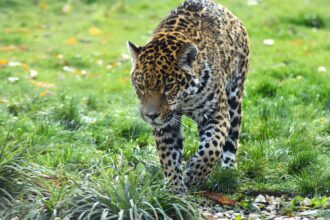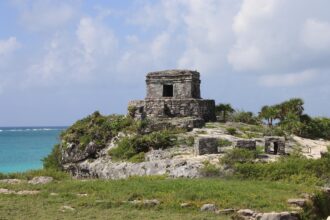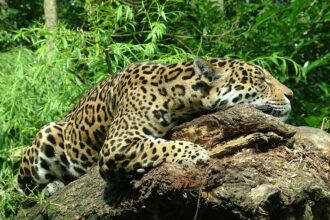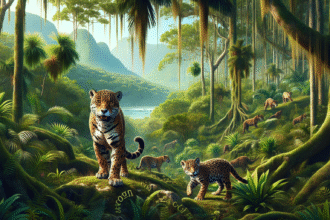The Power of Partnerships: Collaborating with Local Businesses for Jaguar Causes
Understanding the Importance of Jaguars
Jaguars play a crucial role in maintaining the ecological balance of their habitats. As apex predators, they regulate the populations of other species, contributing to biodiversity. However, due to habitat loss, poaching, and climate change, jaguar populations are declining. This decline not only threatens the species itself but also disrupts the ecosystems they inhabit.
The Role of Local Businesses in Wildlife Conservation
Local businesses are integral to community engagement and development. By partnering with wildlife conservation organizations, they can amplify efforts toward conserving jaguar populations and their habitats. These partnerships not only leverage the resources of businesses but also enhance community awareness and involvement. Collaborating with local businesses can create a sustainable impact, making it easier to drive change and reach conservation goals.
Building a Strong Collaborative Framework
-
Identifying Common Goals
The first step in forming partnerships is to identify shared objectives. Local businesses should align their corporate social responsibility (CSR) goals with wildlife conservation efforts. By focusing on common values, such as sustainability and community welfare, partnerships become more impactful and effective. -
Creating Win-Win Scenarios
Successful collaborations should benefit all parties involved. Local businesses can increase their visibility and brand reputation by supporting conservation initiatives, while wildlife organizations gain financial and logistical support. For example, a local restaurant can donate a portion of its profits to jaguar conservation efforts, enhancing its appeal to environmentally conscious consumers. - Engaging the Community
Community engagement is crucial for the success of any conservation initiative. Partnering with local businesses helps to engage residents in the cause. Local businesses can host events, sponsor educational programs, or create awareness campaigns centered on jaguar conservation. The involvement of community members fosters a sense of ownership, encouraging them to actively participate in protecting jaguars.
Implementing Effective Strategies
-
Organizing Fundraising Events
Host events such as charity runs, gala dinners, or wildlife awareness days. Local businesses can contribute through sponsorships or donating a percentage of sales. These events not only raise funds for jaguar causes but also serve as an opportunity for education and awareness. -
Educational Campaigns
Collaborate on educational initiatives that inform the public about the importance of jaguars and their ecosystems. Local businesses can sponsor workshops, distribute informative materials, or create digital campaigns to spread awareness. When community members are educated about the significance of jaguars, they are more likely to support conservation initiatives. - Product Collaborations
Partner with local artisans and businesses to create unique products whose proceeds go toward jaguar conservation. For example, a local craftsman could create jewelry inspired by jaguars, with profits directed towards habitat preservation projects. This approach not only generates funds but also promotes local talent while enhancing the conservation message.
Leveraging Technology
-
Social Media Outreach
Utilize social media platforms to promote partnerships and raise awareness for jaguar conservation. Local businesses can share stories, success metrics, and events, engaging their customers and inviting them to join the cause. Creative content, such as videos and photos, can amplify the outreach efforts. - Mobile Applications
Develop mobile applications that promote conservation initiatives. Local businesses could collaborate on creating an app featuring information about jaguars, ways to help, and local conservation events. Integrating gamification elements may further encourage community participation.
Measuring Impact
-
Tracking Outcomes
Establish metrics to measure the success of partnerships and initiatives. This may include financial contributions, community engagement levels, or changes in public behavior regarding wildlife protection. Regular assessments help in understanding the effectiveness of collaborative efforts and can guide future strategies. - Sharing Success Stories
Celebrating successes helps to build momentum for continued support. Share success stories through local media, social platforms, and community events to inspire more businesses and individuals to join the conservation efforts. Highlighting tangible outcomes can increase donor confidence and encourage additional partnerships.
Challenges to Anticipate
-
Resource Allocation
Financial and human resources can be limited, especially for small businesses. It’s essential to realistically assess the capacities of local businesses and set achievable goals that won’t strain their resources. -
Consistency in Commitment
Ensuring continuous support can be challenging. Businesses may change focus or face financial constraints, which might impact their ability to support conservation projects over the long term. Building strong, personal relationships can help retain partners and keep the momentum going. - Balancing Interests
Different stakeholders may have varying priorities. Ongoing communication is vital in navigating any conflicts and ensuring that all parties remain committed to the joint conservation objectives.
Fostering Long-Term Partnerships
-
Building Trust
Establish trust through transparent communication and reliable partnerships. Providing regular updates on the impact of contributions can reinforce confidence and encourage ongoing support. -
Celebrating Milestones
Recognize and celebrate achieving key milestones in jaguar conservation. This fosters a sense of community and shared accomplishment, reinforcing the value of ongoing collaboration. - Investing in Relationship Development
Long-term partnerships require nurturing relationships between organizations and local businesses. Regular meetings and collaborative brainstorming sessions can help build synergies and maintain engagement.
In conclusion, partnerships between organizations focused on jaguar conservation and local businesses hold enormous potential for driving impactful change in wildlife protection efforts. By leveraging shared goals, fostering community engagement, implementing strategic initiatives, and maintaining robust relationships, these collaborations can create a lasting legacy for jaguar conservation. Emphasizing local involvement not only strengthens community ties but also empowers individuals to take an active role in the preservation of this magnificent species and the ecosystems it inhabits. Through such cooperative efforts, we can ensure that future generations inherit a world where jaguars roam freely and thrive in their natural habitats.







